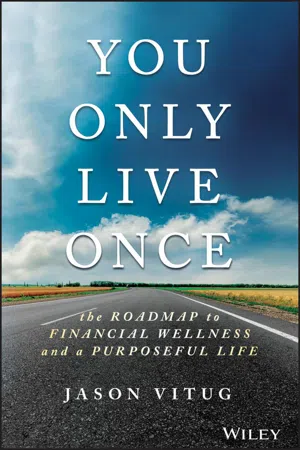
- English
- ePUB (mobile friendly)
- Available on iOS & Android
About this book
Get your finances in order with smart budgeting and money mindfulness
You Only Live Once is the guide to achieving your best life through smart money moves. Before you even begin making a budget, you need to think about why. Where do you see yourself financially in ten years? Five years? This time next year? What does money do for you? Once you know your destination, you can begin charting your course. Step-by-step guidance walks you through the budgeting process, and shows you how to plan your financial path to point toward your goals. You'll learn how to prioritize spending, how to save efficiently, and how to take advantage of simple tools you didn't know you had. Next comes the most important part: taking control. You need to really look at how you perceive and use money day-to-day. Chances are, changing a few habits could give you some breathing room and help you reach your goals sooner.
You work hard for your money, yet there never seems to be enough. You don't need to live like a pauper, but you need to be truly aware of just where your money is going, and why. Financial awareness is the key to a financially secure future, and this book unpacks it all to help you get where you want to go.
- Accept past decisions and articulate your financial goals
- Align your lifestyle with your budget
- Explore your relationship with money
- Re-evaluate financial habits and behaviors
You know you need a budget, but you never seem to get around to doing it. Or maybe you did, but you can never seem to stick to it. Smart planning is a major factor in financial security, and it involves just as much introspection as math. You Only Live Once is more than a budgeting guide—it's a guide to revamping your financial behaviors to achieve the life you want.
Frequently asked questions
- Essential is ideal for learners and professionals who enjoy exploring a wide range of subjects. Access the Essential Library with 800,000+ trusted titles and best-sellers across business, personal growth, and the humanities. Includes unlimited reading time and Standard Read Aloud voice.
- Complete: Perfect for advanced learners and researchers needing full, unrestricted access. Unlock 1.4M+ books across hundreds of subjects, including academic and specialized titles. The Complete Plan also includes advanced features like Premium Read Aloud and Research Assistant.
Please note we cannot support devices running on iOS 13 and Android 7 or earlier. Learn more about using the app.
Information
Part I
On the Road to Financial Wellness
Chapter 1
Are You Living YOLO?
The Millennial Experience
The YOLO Mindset
- Saving. You should be aware of what you value and be willing to invest your time to achieve your goals.
- Spending. What you spend money on is a reflection of your values. Spend on things that matter the most to you and add value in your life.
- Debt. Debt reserves your future time for work rather than fun. Prioritize debt elimination to gain more time for living.
- Investing. Growing your assets decreases your need to exchange your time for income. Make money with money.
Chapter 2
Financial Education and Living Your Dream Lifestyle
Table of contents
- Cover
- Title Page
- Copyright
- Dedication
- Preface
- Acknowledgments
- About the Author
- Introduction
- Part I: On the Road to Financial Wellness
- Part II: Awareness
- Part III: Creating a Plan
- Part IV: Taking Control
- Conclusion
- Index
- EULA